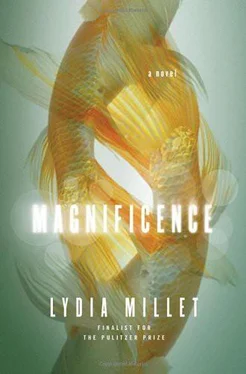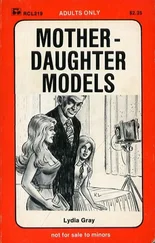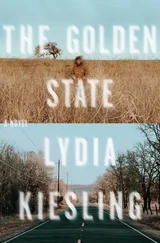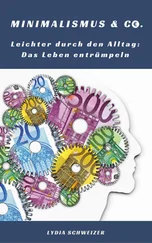But when it came to the animals she was undecided. At first she had been determined to rid herself of their carcasses with all possible speed, but curiously the impulse was fading: the longer she lived with them the greater their hold. Some needed repair, were bald in patches with broken horns or ragged tails. At first, as she walked through the great room with its foxes and otters, this had made them ugly or pathetic; but more and more it made her feel protective.
Their arrangement added to her confusion. She understood the rooms on the second floor — their classification by geography, rough and general though it was. But the ground floor was a jumble. She did not know why the common raccoons of the great room kept company with the foxes, the possums, which were apparently marsupials, or the beavers, classified as semi-aquatic rodents. (She had to look this up.) The old man, she guessed, had not planned at all when he began to collect. At first the assemblages had been thrown together without forethought. A room of BEARS OF THE WORLD, he must have thought, hell yeah. A room of heads with racks. A room of brown mammals, why not.
As the collection grew he’d moved toward a better scheme — still rudimentary but at least organized — placing each mount in a more logical grouping. He’d been unable to help himself, and the more he acquired, the more he had to impose an order. She could see him, in her mind’s eye, being forced toward it. Because without order there could be no true collecting. Without order there was only acquisition.

When she’d been living in the house for six weeks Casey finally paid her a visit.
By then Ramon had moved on to another job — he turned out to be neither an illegal nor a student but the youngest son of a claims adjuster, with ambitions in auto detailing — and she’d started sleeping with Jim the lawyer. Jim was an intelligent and slightly petty man on the surface, but beneath it he was tender. She thought he might be the kind of person who, in the right circumstances, could kill someone. She wondered if this would be a bond between them.
The combination of circumstances required for Jim the lawyer to kill, she suspected, was so specific that it would likely never occur. That made him a would-be murderer at best, unlike her, and a fairly safe bet. Not that he was vicious or cruel — on the contrary, he was mild and gentle. Still she thought he might have a blind spot of rage, some hair trigger that would unleash a buried anger. Many men did; it was hardly unique.
Jim impressed her because most of the adulterers she’d known liked to lie naked and panting beside her and offer up a disquisition on their marriage. It was a common impulse. She herself had learned early on not to talk about Hal, that discussing her husband with others was off limits, but some men treated illicit sex as an entry to marital therapy. And surprisingly by her third time with Jim he had still not brought up his wife, other than to acknowledge he had one. She liked this disinclination to confess.
She was standing over the bathroom sink lazily after he left, gazing at the lines on her face in the mirror, when she heard gravel scrape on the circular drive. Cinching the belt on her bathrobe, she felt around on the floor for her shoes with an outstretched toe, then craned her neck to see out the window. Beyond the branches of an oak — Ramon had told her what each of the trees was in the garden, both the front and the back, and she had faithfully written them down on the landscape map to commit them to memory — she could make out the hood of Casey’s car.
When she invited Casey to come by anytime she’d been sure she’d have ample warning; her daughter didn’t do drop-bys often. She’d assumed the drive to Pasadena was unfamiliar enough that Casey would have to call for directions. Still, now that Casey was here Susan was excited to show her the place, and as she reached for her jeans she wondered if her daughter had seen the lawyer’s car leaving. It was a light-green BMW — unmistakable since Casey knew it from the office.
Also the two of them hadn’t talked about Casey’s livelihood since the airport but Susan knew they would have to discuss it sometime — it ached like a bad tooth at the back of her mouth. She would hate to lose her moral high ground, or the carefully guarded illusion of it. On the other hand, with T. around so often it was doubtful that Casey could be spending much of her time on the phone.
“You’re kidding me,” said Casey, when Susan opened the front door.
She was sitting out on the edge of the cobbled drive, a few feet from her car, with boughs of oak and laurel dipping over her head like a bower.
“What?” asked Susan.
“You’re fucking kidding me,” she said. “All this?”
“I told you,” said Susan.
“You said a big house,” said Casey. “You didn’t say the Taj Mahal. This is ridiculous!”
“It’s eccentric,” said Susan.
Despite herself she felt puffed up by Casey’s admiration, as though the house was her personal creation.
“Come on, honey. Come see the back. The grounds are almost twenty acres.”
“No way,” said Casey, and followed her onto the tiles of the patio and past the tennis court.
Lonely, sometimes, that there were two of them — moments like this, when they were single-file.
It also struck her that Casey should have a new car, that her car was cramped and dinged and there was plenty of money now.
“Do you want a car?” she asked impulsively, turning. “We can get you one. With some of the money from the old house. The sale. I mean look, there’s some cash for once. There are taxes on this place, there are repairs I’m paying for, but other than that, with the proceeds from the house sale, maybe your father’s life insurance, eventually, we’re practically rich.”
Casey stared at her, surprised, and then over her shoulder.
“Are those — parrots?”
Susan turned and looked and saw light-green wings flapping and blurring near the tops of the alders.
“They look like parrots,” she said uncertainly.
“They are parrots,” said Casey. “It’s a whole flock of them. Look!”
A flash of red on their heads, yellow beaks, beady eyes. Susan wished one would alight nearby so she could see it closer up. Get a good look. But they blurred. Why did they have to fly the whole time?
“Parrots,” she repeated.
They watched the parrots, which made a racket with their squawking. People spoke of the beauty of birdsong, but not when it came to parrots. They were the exception that proved the rule.
“They give me the weirdest feeling,” said Casey dreamily. “It’s like they remind me of something I never saw.”
“My whole life I never knew we had wild parrots in L.A. County,” said Susan.
“Did they escape from somewhere?”
“So many?”
“I’m pretty sure they’re not supposed to be here,” said Casey. “When I see nature shows, typically, they don’t feature parrots in Southern California.”
“This is the first time I’ve seen them,” said Susan.
“Huh. I should ask T. He has this animal hobby,” said Casey.
“I meant to ask you about that,” said Susan. “The turnaround, the whole charity thing. So you don’t think he’s — unstable?”
“I don’t know about stable. But he’s less of an asshole now.”
“High praise,” said Susan.
The parrots flapped and squawked, raucous screeches fading. Presently there was silence and the high branches stopped trembling and were still.
“So now,” said Casey. “About that car.”
Читать дальше













